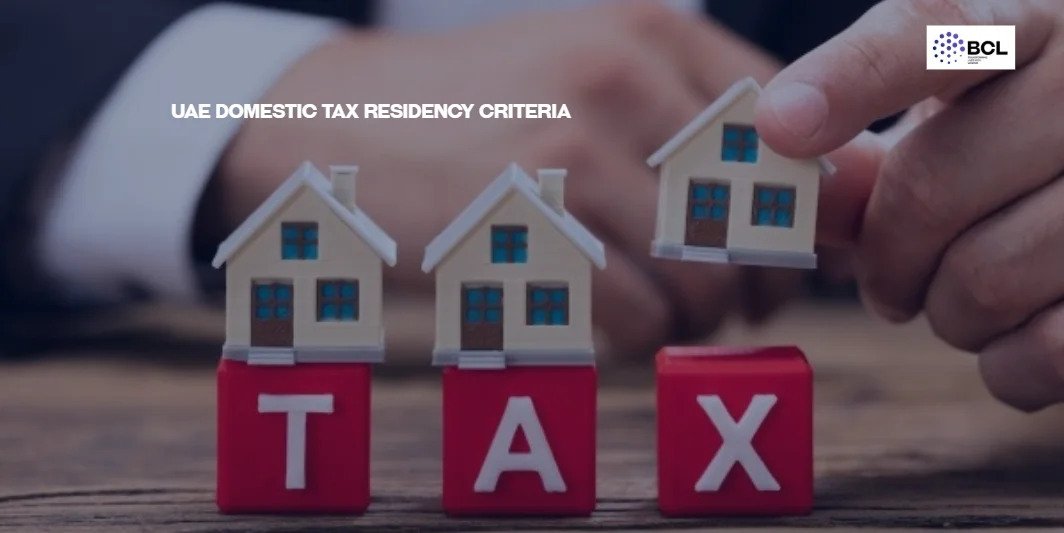The conditions for determining UAE domestic tax residency are outlined in Article 53 of Federal Decree-Law No. 28 of 2022 and Cabinet Decision No. 85 of 2022. Further guidance, particularly for individuals, is provided under Ministerial Decision No. 27 of 2023. Meeting these residency criteria establishes a person as a Tax Resident, and upon a successful application to the Federal Tax Authority (FTA), a Tax Residency Certificate (TRC) will be issued as proof. This certificate is often required by banks or other institutions to confirm tax residency status. However, being recognized as a Tax Resident does not automatically subject an individual or entity to Corporate Tax—they must also qualify as a Taxable Person under UAE Corporate Tax Law to have a tax liability.
Tax Residency for Juridical Persons
According to Article 3 of Cabinet Decision No. 85 of 2022, a juridical person (legal entity) is considered a UAE Tax Resident if:
- It is incorporated, registered, or otherwise established in the UAE, or
- It is classified as a Tax Resident under other UAE tax laws, including the Corporate Tax Law.
Juridical Persons Formed in the UAE
Legal entities can take various forms, including:
- Companies such as Limited Liability Companies (LLCs), Private Shareholding Companies, and Public or Private Joint Stock Companies
- Civil Companies
- Foundations
- Trusts, as per Federal Law No. 31 of 2023
These tax residency rules apply equally to businesses in Free Zones. If a juridical person is incorporated in a Free Zone, it is still recognized as a UAE Tax Resident and can apply for a Tax Residency Certificate.
Learn how to apply for a Tax Residency Certificate in the UAE to validate your tax status for domestic and international reporting.
Examples
- UAE-Based Juridical Person
Company ABC is an LLC registered in Dubai with operational branches in Sharjah and Abu Dhabi. As an entity incorporated in the UAE, Company ABC qualifies as a UAE Tax Resident. Even though it operates across multiple emirates, its branches are considered extensions of its head office in Dubai.
- Foreign Company with UAE Clients
Company P is incorporated and managed in Country P. While it earns substantial revenue from UAE customers, it has no physical presence or dependent agents in the UAE. As a result, Company P is not a UAE Tax Resident, despite generating significant income from the UAE.
Juridical Persons Classified as Tax Residents Under Other UAE Tax Laws
A juridical person may also be regarded as a UAE Tax Resident if it qualifies as a Resident Person for tax purposes under laws such as the Corporate Tax Law. Even if an entity is not incorporated in the UAE, it can still be considered a Resident Person if it is effectively managed and controlled from within the UAE.
- Foreign Company Managed in the UAE
Company D is a limited company incorporated in Country D. However, in 2024, its management and control functions were exercised from the UAE, making it a Resident Person for Corporate Tax purposes. Consequently, Company D’s worldwide income became subject to UAE Corporate Tax.
Tax Residency of Foreign Companies with UAE Branches
A UAE branch of a foreign juridical person functions as an extension of its parent or head office rather than a separate legal entity. Consequently, a UAE branch of a foreign company—which is incorporated and effectively managed in another jurisdiction—is not classified as a UAE Tax Resident. Instead, the foreign parent company is considered a Non-Resident Person for tax purposes.
However, if a foreign company—despite being incorporated abroad—is effectively managed and controlled from within the UAE, then both the parent company and its UAE branches will be treated as Resident Persons under the UAE Corporate Tax Law, making them Tax Residents in the UAE.
With the economic substance regulations now updated, businesses must re-evaluate how they determine tax residency and regulatory compliance.
Tax Residency Status of Exempt Persons
The tax residency classification of Exempt Persons depends on the specific category they fall under. There are four main categories of Exempt Persons:
Category 1: Automatically Exempt Persons
This category includes Government Entities. If a Government Entity engages in any non-exempt business activities, such activities are treated as separate businesses and are subject to Corporate Tax. Since a Government Entity is established in the UAE, it is considered a Tax Resident by default.
Category 2: Exempt Upon Notification & Meeting Conditions
This applies to entities involved in Extractive Business or Non-Extractive Natural Resource Business. Any business operations that do not fall under the exempted activity are considered independent businesses and subject to Corporate Tax. Since these entities are either incorporated or recognized in the UAE, they are considered Tax Residents.
Category 3: Exempt by Inclusion in a Cabinet Decision
Entities such as Government-Controlled Entities and Qualifying Public Benefit Entities fall under this category. Provided they meet the required conditions and are incorporated or legally recognized in the UAE, they are considered Tax Residents.
Category 4: Exempt Upon FTA Approval
This category covers public and private pension and social security funds, Qualifying Investment Funds, and UAE-incorporated juridical persons that are wholly owned and controlled by certain Exempt Persons. These entities are either formed or recognized in the UAE, making them Tax Residents.
Tax Residency of Natural Persons in the UAE
A natural person qualifies as a UAE Tax Resident under Article 4 of Cabinet Decision No. 85 of 2022 if they meet at least one of the following three conditions:
- Physical Presence for 183 Days or More
- The individual has been physically present in the UAE for at least 183 days within any 12-month period.
- Physical Presence for 90 Days or More with Additional Criteria
- The individual has been in the UAE for at least 90 days within a 12-month period, and:
- They are either a UAE or GCC national, or hold a valid UAE Residence Permit.
- They either have a Permanent Place of Residence in the UAE or conduct employment or business activities in the country.
- The individual has been in the UAE for at least 90 days within a 12-month period, and:
- Primary Place of Residence & Financial Ties
- The individual’s main place of residence and financial and personal interests are cantered in the UAE.
Conclusion
Determining tax residency in the UAE is a critical aspect of compliance for both individuals and juridical persons. The classification as a UAE Tax Resident depends on various factors, including physical presence, place of residence, financial ties, and business operations. While obtaining a Tax Residency Certificate (TRC) from the Federal Tax Authority (FTA) serves as proof of tax residency, it does not automatically impose corporate tax liability unless the entity or individual qualifies as a Taxable Person under UAE Corporate Tax Law. Understanding these criteria is essential for businesses and individuals to manage their tax obligations effectively.
To understand how tax residency ties into corporate tax liability, refer to our detailed overview of the Corporate Tax Law in the UAE.
How BCL Globiz can help?
Navigating UAE tax residency regulations can be complex, requiring a thorough understanding of applicable laws and compliance requirements. At BCL Globiz, we provide expert guidance on tax residency assessments, application procedures for Tax Residency Certificates (TRC), and corporate tax obligations. Our team ensures that businesses and individuals remain compliant with UAE tax laws while optimizing their tax positions. Whether you need assistance with tax structuring, regulatory compliance, or corporate tax planning, BCL Globiz is here to support you every step of the way.
Once tax residency is confirmed, ensure timely submission of returns by reviewing the UAE Corporate Tax Return Filing Deadlines.
For more details contact our expert at rakesh@bclglobiz.com and visit www.bcl.ae today.








